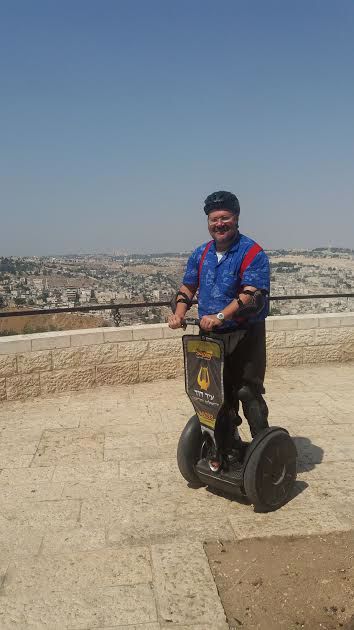| Have the Strength to be Flexible
» Flexibility is a very important tool in interpersonal relations. If you are rigid in your demands, you might frequently get your way -- but you will not have many friends. Learn to differentiate between what is important and what is not. Someone who feels he must always get his way is telling himself, "If I give in to others, it means I am weak." The Torah attitude is that honoring others is what makes a person honored.
Love Yehuda Lave |
|
|
| More than half of Israelis overweight, OECD report finds Israelis still thinner than most developed countries, and living longer, thanks to higher health care spending and less smoking, according to survey More than half of all Israeli adults are overweight or obese according to a report released Sunday, which also found that people in Israel are living 10 years longer than in 1970. Israel is the 15th thinnest of the 43 nations covered by the "Health at a Glance 2017" survey released by the The Organisation for Economic Co-operation and Development (OECD). Nonetheless 53 percent of Israelis are overweight, with a body mass index of over 25, including 16.6% who are obese, with a BMI of over 30. The numbers are still below the OECD average of 54% for overweight and 19% for obese. In the US, Hungary, New Zealand and Mexico, over 30% of the population is obese. Japan is the thinnest nation and Mexico and the US are the two countries with the fattest citizens.  Percentage of population that is overweight and obese in 2015. (OECD) There was also good news along with the bad. The OECD survey found life expectancy for Israelis has increased by 10 years since 1970, with an average person now living to the age of 82.1. In 1970, the average Israeli only lived to be 71.8-years-old. The number dovetailed with the OECD average of 10 years of added life expectancy across the bloc of developed nations. For Israeli men, the average life expectancy is 80.1 years and Israeli women on average live four years longer, to the age of 84.1.  Average Israeli life expectancy 2015. (OECD) Japan has the highest average life expectancy, with 83.9 and Latvia has the lowest, with 74.6. Average life expectancy for men with higher education is 7.5 years longer than for those without. For women, the gap is five years. The study found that the increase was thanks to a drop in unhealthy lifestyles and better health care. "Empirical results demonstrate that while life expectancy depends on factors both within and beyond the health system, health spending has been a major driver of life expectancy gains in recent decades… Education and income have also made significant contributions to life expectancy gains…" along with decreased alcohol use and less smoking, the study read. The survey found that smoking has declined throughout the OECD, and in Israel, only 19.6% of people smoke daily. Israelis drink an average of 2.6 liters of alcohol a year, third lowest in the OECD. Israeli teens eat more vegetables than those in almost all other countries, with only Belgians consuming more. But Israeli teens are also the least likely to do daily moderate-to-vigorous physical activity. Israel has the highest rate of colon cancer survival in the OECD, at 71.7%, compared to an average of just 62.8%. Israel also has the fifth lowest suicide rate among developed nations. |
|
|
Read about Steve Gar here: http://www.ynetnews.com/articles/0,7340,L-4572765,00.html http://www.inn.co.il/Besheva/Article.aspx/12915 Bio:
Steve Gar was born in Johannesburg, South Africa to a traditional Jewish family. He began his tertiary education by studying a Bcom, majoring in Accountancy and Industrial Psychology, while interning at an accounting firm. During this time, he joined a communal counter-terrorism reaction unit and was part of the protective detail for the Chief Rabbi of SA. Steve then became the head co-coordinator for the Department of Informal Jewish Education (DIJE).
At the age of 22, Steve made Aliyah, joining the religious Hesder program, combining Yeshiva learning with military service. He studied at Yeshivat Har Etzion and served in the Golani infantry unit, Battalion 13 - specializing in the Negev (sub-machine gun) and received an award for 'soldier of excellence'. In 2002, he married Canadian born Natalie Pakes in Jerusalem, and the couple moved to Sydney Australia for 5 years where he worked as the Shaliach for Bnei Akiva while Natalie completed her PhD in Clinical Psychology. Upon returning to Israel, Steve assisted in starting a Yeshiva High school for English speaking Olim (Yerushalayim Torah Academy - YTA). Soon afterwards, he was invited by the Chief Rabbi of Efrat, HaRav Riskin, to join the Kollel at the Joseph & Gwendolyn Straus Rabbinical Seminary and began studying for the Rabbinate. At the same time, he completed his training as a combat Instructor, specializing in counter-terrorism, and is now responsible for training military units through the Central command of the Gush Etzion. He currently serves as a soldier on a counter-terrorist unit while completing his Rabbinical studies. In addition, Steve is the assistant director of a special needs program, Yeshivat Darkaynu. Steve and Natalie live in Elazar, Gush Etzion with their 5 children. 24's Jack Bauer is no longer with us, but the reality of life in Israel has bred a local replacement for the counter-terrorism specialist who makes personal sacrifices for the uncompromised security of the nation. Steve Gar, who even maintains similar physical characteristics to Keiefer Sutherland, spends his days as a counter-terrorism instructor at the Caliber 3 training facility and his nights studying to be ordained as a rabbi. But Gar's roots began in South Africa, where he grew up in an environment far away from respecting Shabbat. "I was naughty child," he told Ynet. "I took drugs, but everything was empty... I said to myself that I want to find something that gives some meaning to life. That's how I started searching: Who created us? Why are we here? I started slowly; I didn't want to create problems at home." Gar's military service in the IDF and his natural desire to protect Jews wherever they may be, paved the way for his life as a security expert. He eventually married and settled down with his family the Gush Etzion region.  Steve Gar and his family. He lends his efforts as a counter-terrorism expert by training soldiers and performing demonstrations and lessons for tourists. Gar's demonstrations for foreigners always begin with a motivational, pro-Israel speech. "I don't think that the IDF should be called the IDF. I think it should be called the JDF: the Jewish Defense Force," he said when Ynet joined him for one such session. "In the year 2014, Jews in the world need to know that they aren't alone. You have a nation behind you." "I know what you've seen on BBC and CNN," he continued. "That Israeli special units, my unit, loves killing innocent Palestinians. That is a lie. I want you to see how we train. I don't shoot someone because of their religious or political beliefs. I don't shoot them because of the way they look; I shoot them because they're killing innocent civilians." |
|
|
Scientists now know why people with autism don't like to be touched I Touching can be difficult for people with autism, and scientists now know why. (Photo: Zahraa Saleh / Shutterstock) Scientists now know why people with autism don't like to be touched It's not because they're anti-social or rude. A new study unlocks a mystery in how autism affects people's brai Not everyone likes to be touched. But for people with autism spectrum disorder (ASD), this is more than a simple preference; according to a new study, it's more likely the result of a tangible, physiological reaction in the brain. The study, conducted by researchers at the University of Haifa in Israel, offers an intriguing window into the workings of the brain in people with autism, which can often be enigmatic and puzzling. "Because touch plays a critical role in our social emotional development and provides us with essential means to express our emotions, establish intimacy, and maintain social bonds, studying and characterizing the way in which social touch is processed by both healthy and impaired individuals are important steps," said study co-author Leehe Peled-Avron, a graduate student in the psychology department at the university. Learning how the brain reacts to stimuli is key to understanding autism. (Photo: Bangkokhappiness/Shutterstock) The researchers analyzed brain scans of 53 people, some of whom were on the autism spectrum, and measured for something they call hypervigilance. They found, consistent with common wisdom, that people with autism respond differently to touch than neurotypical people. But looking deeper, they were able to see why: their brain scans showed that the person was reacting the same way that someone with a phobia would react. Conclusion? People with autism don't just dislike being touched; they are physiologically affected by it. And as with many scientific studies, this one can be used to inform future research and possibly alter the way therapists and doctors treat patients. "The results of this study improve our understanding of people with ASD," Peled-Avron said from her office in Israel. "Social touch is an integral part of our lives, in both happy and sad events, and now we can understand why for some people on the autistic spectrum all these events arouse anxiety." Jaime Bender is a staff writer, copy editor and web producer at From the Grapevine who also manages Israeli Kitchen, From The Grapevine's food chann |
|
|
Beyond Words Selected Writings of Rabbi Meir Kahane, 1960-1990 Volume 5 FEAR, THE NEW ZIONISM Written January 10, 1986 If there is anything left of secular Zionism to prove its success in the wake of its ideological tatters and bankruptcy, it can only be the claim that it took the Jew out of the ghetto, out of the exile, out of fear and terror, and created a state of security and safety for the Jewish people. Alas, the truth is that what has occurred is that Israel is in the process of creating a new Minsk, Pinsk, Sa'ana and Brooklyn. Fear has become a permanent resident of Israel, moving into the hearts and minds of hundreds of thousands of Jews who fear the night, fear to hitch rides, fear to drive in the evening through Arab villages, fear to allow their children to play alone in the streets. Four Jews have been stabbed within two months, within the Old City of Jerusalem, capital of Israel, home of Teddy Kollek and his Arab friends. One was Yossi Martin, a tank commander, whose girlfriend blurted, "I will never again enter the Old City." Fear.It is hard to find Jews who are prepared to use the Damascus Gate to walk to the Western Wall. Fear. The Jerusalem weekly paper Kol Ha'ir printed a survey asking, "Should we continue going to East Jerusalem?" Fear. As yet another soldier, waiting to hitch a ride, was murdered in cold blood (just three kilometers from his Petach Tikvah home), the response from hysterical politicians was, "compel public transportation to give rides to (female soldiers!" Which led, of course, to outrage and the brave new Zionist demand, "free bus transportation to male soldiers, too." And, since this leaves civilians to the pleasure of the Arabs who move freely and without fear about Israel, naturally a columnist in the Histradrut paper Dvar wrote an article, "Home Before Dark," in which he outlined his terror, driving through Jerusalem l ate at night. That secular Zionism from its beginning was the bankrupt and naked of all ideological meaning was obvious to me long ago. But here, we see in the State of Israel, that rose in order to sanctify G-d's name through Jewish power and strength and victory, the exact opposite – Hillul Hashem, desecration of G-d's name – as the same fear and terror of the Exile is recreated in Hebrew on the soil of the Holy land. The nations, the gentile, understand Jewish destiny and truth only in terms of power and victory. If for two millennia they were able to persecute, trample, humiliate, burn, gas and massacre the Jew – to them this was proof not only of Jewish impotence, but of the very non-existence of the G-d of the Jewish people! Defeat, humiliation and weakness of the Jew have always been the yardsticks of gentile desecration of G-d's name, whereas power and victory of the Jew over his enemies have always been proof to the gentile that the G-d of Israel is One and the only one. Kiddush Hashem, sanctification! The pitiful secularists of Israel, joined by the ghettoized ritualists, have institutionalized fear in Israel. They desecrate G-d's name daily. The answer to Arab arrogance, to attacks on Jews, stoning of Jews, stabbing of Jews, murder of Jews – is not to have Jews fearfully ride public buses or use the "Jewish" Jaffa Gate rather than the "Arab" Damascus Gate in the Old City. It is not to tell Jews to keep a watchful eye out for bombs and explosive devices. This is the policy of Minsk and Brownsville, Brooklyn. This is pandering to the fear and humiliation of the ghetto and Exile we left. This is the reincarnation of Hillul Hashem in the Land of Israel, the Land of Kiddush Hashem. The answer to the Arab who desecrates G-d's name by attacking Jews is to rise up with the Jewish wrath of G-d and drive the contemptuous Arab from the land. For in the end, the removal of the Arab is the removal of desecration. Jewish power and strength and pride and confidence – walking with the G-d of Israel – are the Jewish reply to Both Arab and Hellenized Jew.
|
|
|
See you tomorrow
Love Yehuda Lave |
|
|
| | | |
 | | | | | |
|  |
|
| |
|










No comments:
Post a Comment